Education and Employment Transitions: A Comprehensive Impact Analysis
VerifiedAdded on 2020/11/12
|6
|1550
|300
Essay
AI Summary
This essay delves into the complex and multifaceted impact of transitions from education to employment. It explores the challenges faced by young people in the labor market, including job shifts, mismatches, and unemployment, and their subsequent effects on educational attainment. The essay examines both the positive and negative consequences of these transitions, such as the potential for vocational education to enhance employability and the rise of NEET (Not in Education, Employment, or Training) situations. It discusses various factors influencing these transitions, including poverty, family background, and school experiences, and considers the role of life skills and support in helping youth navigate these changes. The essay also highlights the importance of addressing the link between education and labor market outcomes to improve youth employment prospects, referencing studies and various countries' experiences. The conclusion emphasizes the need to consider both the benefits and drawbacks of transitions and the situational factors influencing their impact on education and employment.
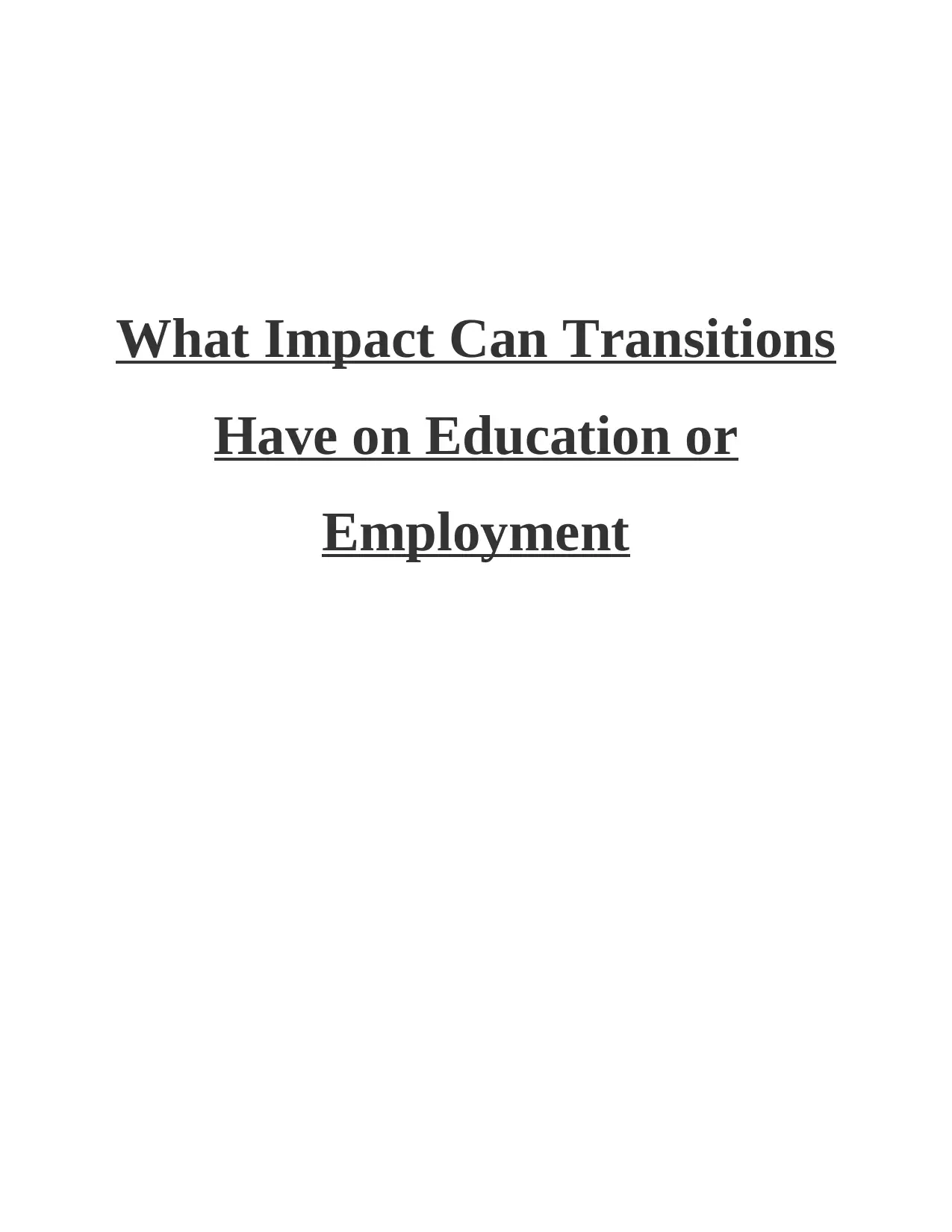
What Impact Can Transitions
Have on Education or
Employment
Have on Education or
Employment
Paraphrase This Document
Need a fresh take? Get an instant paraphrase of this document with our AI Paraphraser
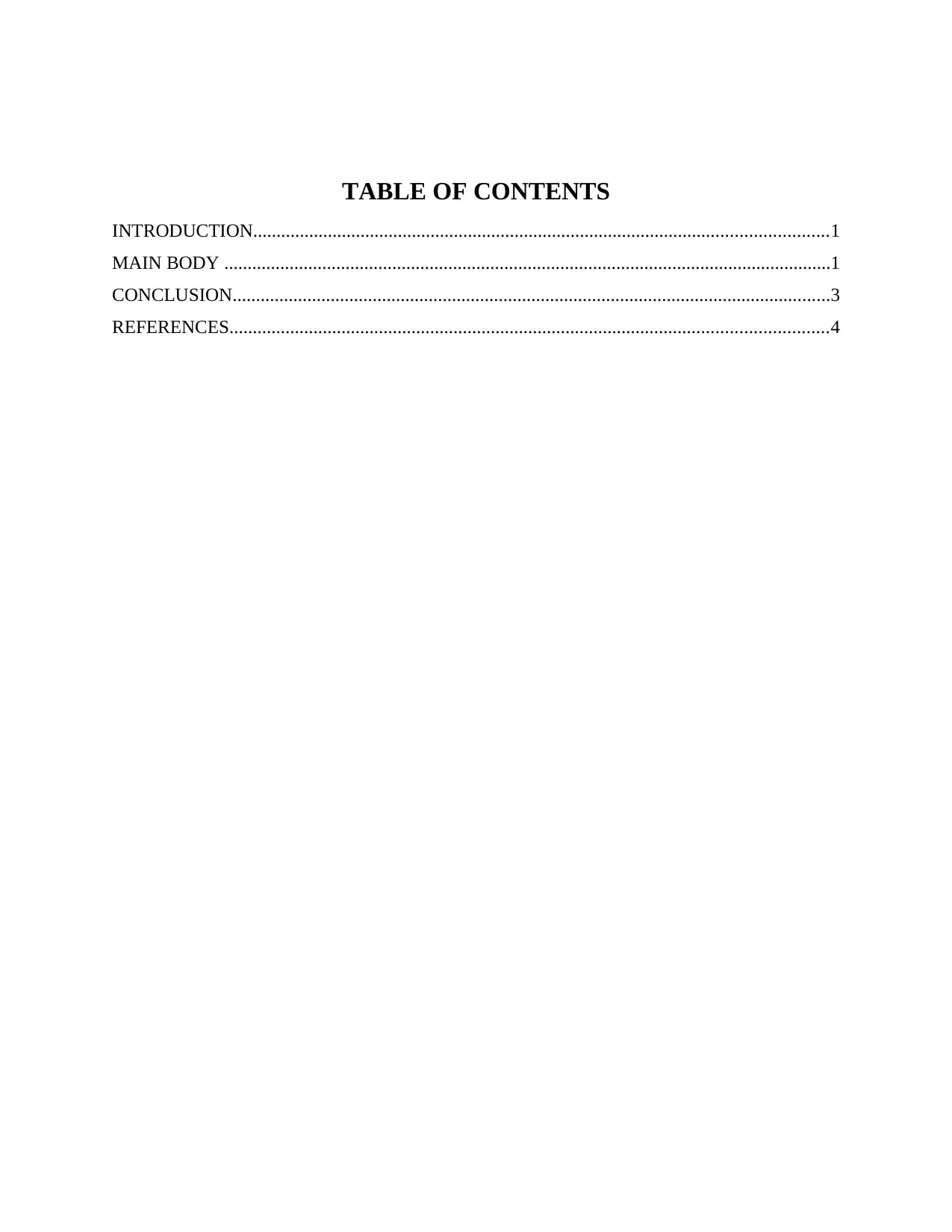
TABLE OF CONTENTS
INTRODUCTION...........................................................................................................................1
MAIN BODY ..................................................................................................................................1
CONCLUSION................................................................................................................................3
REFERENCES................................................................................................................................4
INTRODUCTION...........................................................................................................................1
MAIN BODY ..................................................................................................................................1
CONCLUSION................................................................................................................................3
REFERENCES................................................................................................................................4
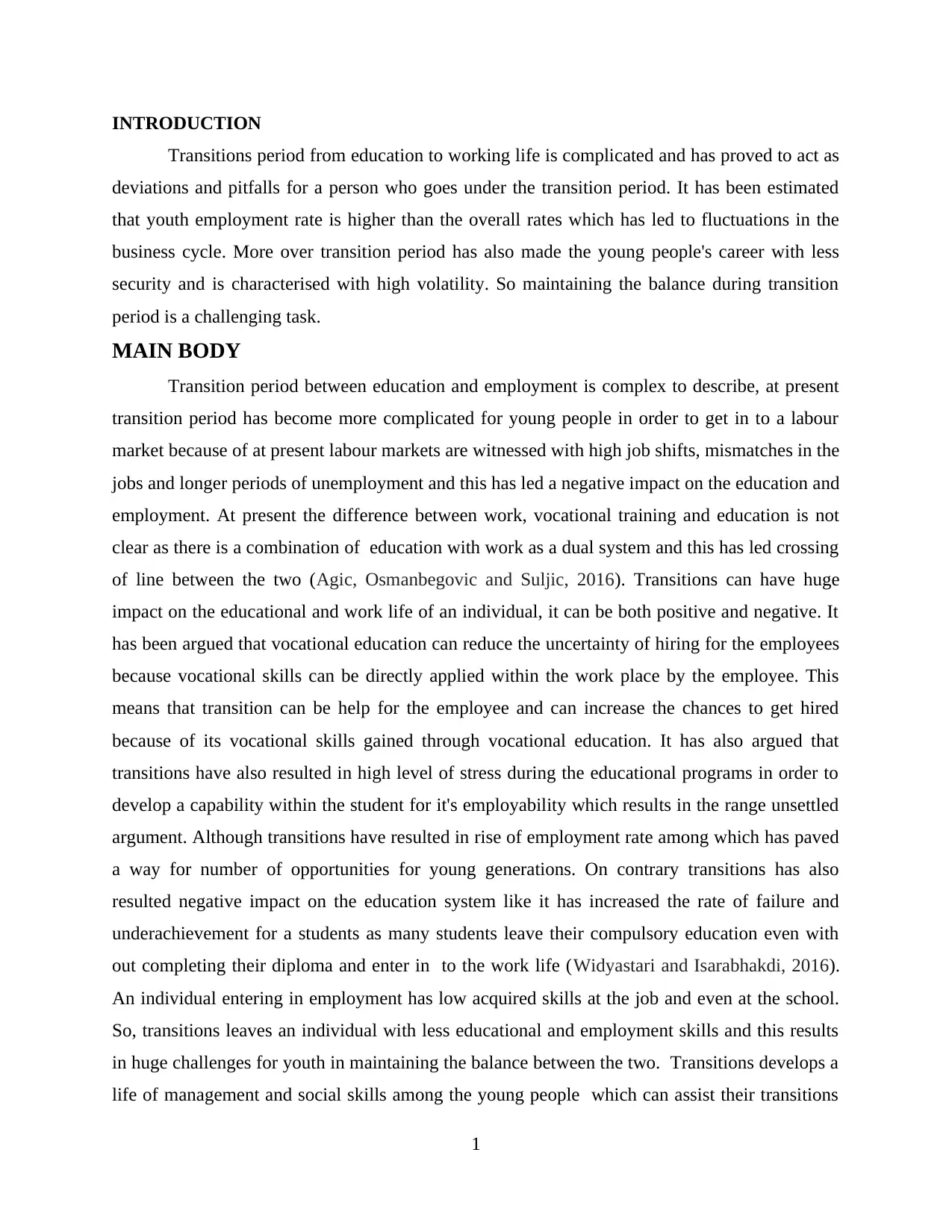
INTRODUCTION
Transitions period from education to working life is complicated and has proved to act as
deviations and pitfalls for a person who goes under the transition period. It has been estimated
that youth employment rate is higher than the overall rates which has led to fluctuations in the
business cycle. More over transition period has also made the young people's career with less
security and is characterised with high volatility. So maintaining the balance during transition
period is a challenging task.
MAIN BODY
Transition period between education and employment is complex to describe, at present
transition period has become more complicated for young people in order to get in to a labour
market because of at present labour markets are witnessed with high job shifts, mismatches in the
jobs and longer periods of unemployment and this has led a negative impact on the education and
employment. At present the difference between work, vocational training and education is not
clear as there is a combination of education with work as a dual system and this has led crossing
of line between the two (Agic, Osmanbegovic and Suljic, 2016). Transitions can have huge
impact on the educational and work life of an individual, it can be both positive and negative. It
has been argued that vocational education can reduce the uncertainty of hiring for the employees
because vocational skills can be directly applied within the work place by the employee. This
means that transition can be help for the employee and can increase the chances to get hired
because of its vocational skills gained through vocational education. It has also argued that
transitions have also resulted in high level of stress during the educational programs in order to
develop a capability within the student for it's employability which results in the range unsettled
argument. Although transitions have resulted in rise of employment rate among which has paved
a way for number of opportunities for young generations. On contrary transitions has also
resulted negative impact on the education system like it has increased the rate of failure and
underachievement for a students as many students leave their compulsory education even with
out completing their diploma and enter in to the work life (Widyastari and Isarabhakdi, 2016).
An individual entering in employment has low acquired skills at the job and even at the school.
So, transitions leaves an individual with less educational and employment skills and this results
in huge challenges for youth in maintaining the balance between the two. Transitions develops a
life of management and social skills among the young people which can assist their transitions
1
Transitions period from education to working life is complicated and has proved to act as
deviations and pitfalls for a person who goes under the transition period. It has been estimated
that youth employment rate is higher than the overall rates which has led to fluctuations in the
business cycle. More over transition period has also made the young people's career with less
security and is characterised with high volatility. So maintaining the balance during transition
period is a challenging task.
MAIN BODY
Transition period between education and employment is complex to describe, at present
transition period has become more complicated for young people in order to get in to a labour
market because of at present labour markets are witnessed with high job shifts, mismatches in the
jobs and longer periods of unemployment and this has led a negative impact on the education and
employment. At present the difference between work, vocational training and education is not
clear as there is a combination of education with work as a dual system and this has led crossing
of line between the two (Agic, Osmanbegovic and Suljic, 2016). Transitions can have huge
impact on the educational and work life of an individual, it can be both positive and negative. It
has been argued that vocational education can reduce the uncertainty of hiring for the employees
because vocational skills can be directly applied within the work place by the employee. This
means that transition can be help for the employee and can increase the chances to get hired
because of its vocational skills gained through vocational education. It has also argued that
transitions have also resulted in high level of stress during the educational programs in order to
develop a capability within the student for it's employability which results in the range unsettled
argument. Although transitions have resulted in rise of employment rate among which has paved
a way for number of opportunities for young generations. On contrary transitions has also
resulted negative impact on the education system like it has increased the rate of failure and
underachievement for a students as many students leave their compulsory education even with
out completing their diploma and enter in to the work life (Widyastari and Isarabhakdi, 2016).
An individual entering in employment has low acquired skills at the job and even at the school.
So, transitions leaves an individual with less educational and employment skills and this results
in huge challenges for youth in maintaining the balance between the two. Transitions develops a
life of management and social skills among the young people which can assist their transitions
1
⊘ This is a preview!⊘
Do you want full access?
Subscribe today to unlock all pages.

Trusted by 1+ million students worldwide
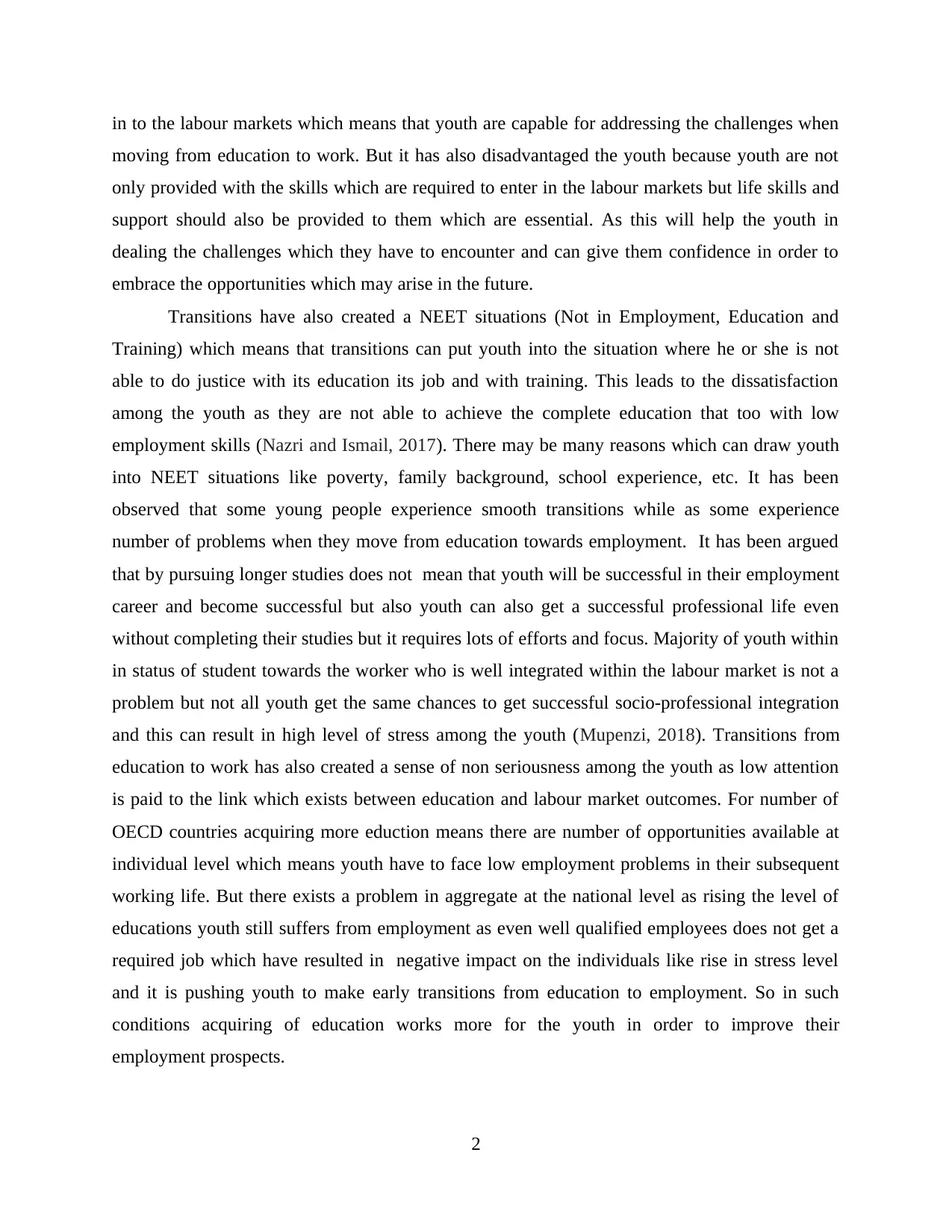
in to the labour markets which means that youth are capable for addressing the challenges when
moving from education to work. But it has also disadvantaged the youth because youth are not
only provided with the skills which are required to enter in the labour markets but life skills and
support should also be provided to them which are essential. As this will help the youth in
dealing the challenges which they have to encounter and can give them confidence in order to
embrace the opportunities which may arise in the future.
Transitions have also created a NEET situations (Not in Employment, Education and
Training) which means that transitions can put youth into the situation where he or she is not
able to do justice with its education its job and with training. This leads to the dissatisfaction
among the youth as they are not able to achieve the complete education that too with low
employment skills (Nazri and Ismail, 2017). There may be many reasons which can draw youth
into NEET situations like poverty, family background, school experience, etc. It has been
observed that some young people experience smooth transitions while as some experience
number of problems when they move from education towards employment. It has been argued
that by pursuing longer studies does not mean that youth will be successful in their employment
career and become successful but also youth can also get a successful professional life even
without completing their studies but it requires lots of efforts and focus. Majority of youth within
in status of student towards the worker who is well integrated within the labour market is not a
problem but not all youth get the same chances to get successful socio-professional integration
and this can result in high level of stress among the youth (Mupenzi, 2018). Transitions from
education to work has also created a sense of non seriousness among the youth as low attention
is paid to the link which exists between education and labour market outcomes. For number of
OECD countries acquiring more eduction means there are number of opportunities available at
individual level which means youth have to face low employment problems in their subsequent
working life. But there exists a problem in aggregate at the national level as rising the level of
educations youth still suffers from employment as even well qualified employees does not get a
required job which have resulted in negative impact on the individuals like rise in stress level
and it is pushing youth to make early transitions from education to employment. So in such
conditions acquiring of education works more for the youth in order to improve their
employment prospects.
2
moving from education to work. But it has also disadvantaged the youth because youth are not
only provided with the skills which are required to enter in the labour markets but life skills and
support should also be provided to them which are essential. As this will help the youth in
dealing the challenges which they have to encounter and can give them confidence in order to
embrace the opportunities which may arise in the future.
Transitions have also created a NEET situations (Not in Employment, Education and
Training) which means that transitions can put youth into the situation where he or she is not
able to do justice with its education its job and with training. This leads to the dissatisfaction
among the youth as they are not able to achieve the complete education that too with low
employment skills (Nazri and Ismail, 2017). There may be many reasons which can draw youth
into NEET situations like poverty, family background, school experience, etc. It has been
observed that some young people experience smooth transitions while as some experience
number of problems when they move from education towards employment. It has been argued
that by pursuing longer studies does not mean that youth will be successful in their employment
career and become successful but also youth can also get a successful professional life even
without completing their studies but it requires lots of efforts and focus. Majority of youth within
in status of student towards the worker who is well integrated within the labour market is not a
problem but not all youth get the same chances to get successful socio-professional integration
and this can result in high level of stress among the youth (Mupenzi, 2018). Transitions from
education to work has also created a sense of non seriousness among the youth as low attention
is paid to the link which exists between education and labour market outcomes. For number of
OECD countries acquiring more eduction means there are number of opportunities available at
individual level which means youth have to face low employment problems in their subsequent
working life. But there exists a problem in aggregate at the national level as rising the level of
educations youth still suffers from employment as even well qualified employees does not get a
required job which have resulted in negative impact on the individuals like rise in stress level
and it is pushing youth to make early transitions from education to employment. So in such
conditions acquiring of education works more for the youth in order to improve their
employment prospects.
2
Paraphrase This Document
Need a fresh take? Get an instant paraphrase of this document with our AI Paraphraser
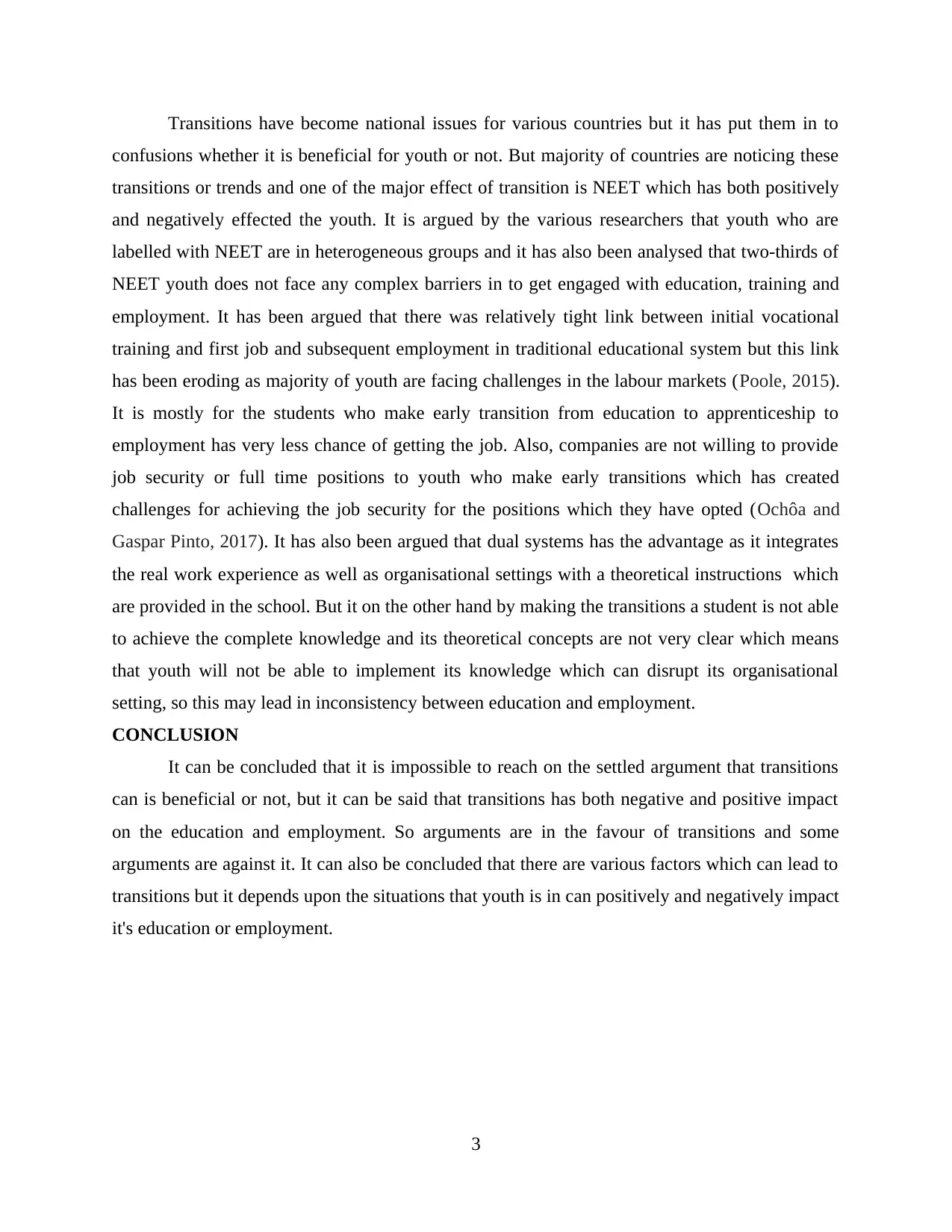
Transitions have become national issues for various countries but it has put them in to
confusions whether it is beneficial for youth or not. But majority of countries are noticing these
transitions or trends and one of the major effect of transition is NEET which has both positively
and negatively effected the youth. It is argued by the various researchers that youth who are
labelled with NEET are in heterogeneous groups and it has also been analysed that two-thirds of
NEET youth does not face any complex barriers in to get engaged with education, training and
employment. It has been argued that there was relatively tight link between initial vocational
training and first job and subsequent employment in traditional educational system but this link
has been eroding as majority of youth are facing challenges in the labour markets (Poole, 2015).
It is mostly for the students who make early transition from education to apprenticeship to
employment has very less chance of getting the job. Also, companies are not willing to provide
job security or full time positions to youth who make early transitions which has created
challenges for achieving the job security for the positions which they have opted (Ochôa and
Gaspar Pinto, 2017). It has also been argued that dual systems has the advantage as it integrates
the real work experience as well as organisational settings with a theoretical instructions which
are provided in the school. But it on the other hand by making the transitions a student is not able
to achieve the complete knowledge and its theoretical concepts are not very clear which means
that youth will not be able to implement its knowledge which can disrupt its organisational
setting, so this may lead in inconsistency between education and employment.
CONCLUSION
It can be concluded that it is impossible to reach on the settled argument that transitions
can is beneficial or not, but it can be said that transitions has both negative and positive impact
on the education and employment. So arguments are in the favour of transitions and some
arguments are against it. It can also be concluded that there are various factors which can lead to
transitions but it depends upon the situations that youth is in can positively and negatively impact
it's education or employment.
3
confusions whether it is beneficial for youth or not. But majority of countries are noticing these
transitions or trends and one of the major effect of transition is NEET which has both positively
and negatively effected the youth. It is argued by the various researchers that youth who are
labelled with NEET are in heterogeneous groups and it has also been analysed that two-thirds of
NEET youth does not face any complex barriers in to get engaged with education, training and
employment. It has been argued that there was relatively tight link between initial vocational
training and first job and subsequent employment in traditional educational system but this link
has been eroding as majority of youth are facing challenges in the labour markets (Poole, 2015).
It is mostly for the students who make early transition from education to apprenticeship to
employment has very less chance of getting the job. Also, companies are not willing to provide
job security or full time positions to youth who make early transitions which has created
challenges for achieving the job security for the positions which they have opted (Ochôa and
Gaspar Pinto, 2017). It has also been argued that dual systems has the advantage as it integrates
the real work experience as well as organisational settings with a theoretical instructions which
are provided in the school. But it on the other hand by making the transitions a student is not able
to achieve the complete knowledge and its theoretical concepts are not very clear which means
that youth will not be able to implement its knowledge which can disrupt its organisational
setting, so this may lead in inconsistency between education and employment.
CONCLUSION
It can be concluded that it is impossible to reach on the settled argument that transitions
can is beneficial or not, but it can be said that transitions has both negative and positive impact
on the education and employment. So arguments are in the favour of transitions and some
arguments are against it. It can also be concluded that there are various factors which can lead to
transitions but it depends upon the situations that youth is in can positively and negatively impact
it's education or employment.
3
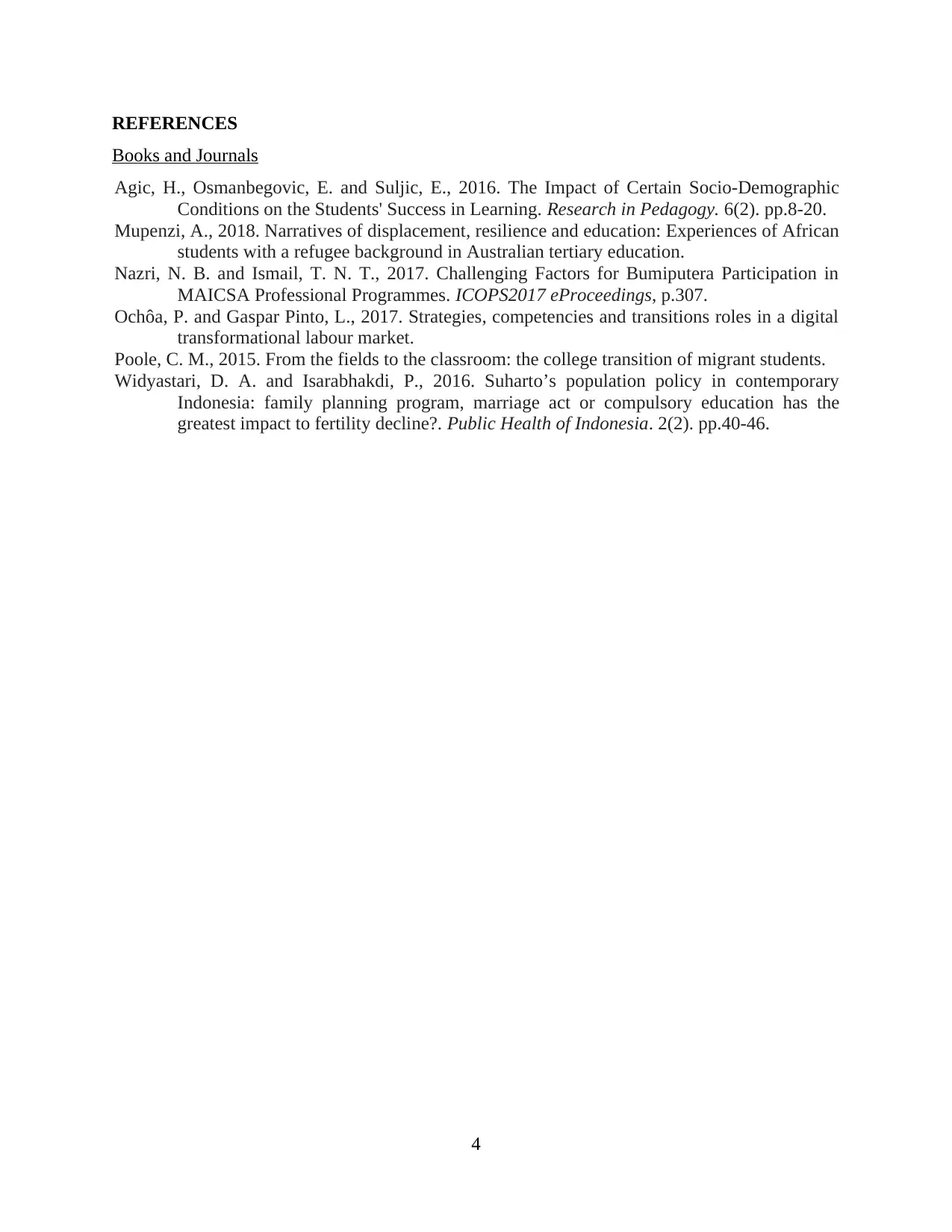
REFERENCES
Books and Journals
Agic, H., Osmanbegovic, E. and Suljic, E., 2016. The Impact of Certain Socio-Demographic
Conditions on the Students' Success in Learning. Research in Pedagogy. 6(2). pp.8-20.
Mupenzi, A., 2018. Narratives of displacement, resilience and education: Experiences of African
students with a refugee background in Australian tertiary education.
Nazri, N. B. and Ismail, T. N. T., 2017. Challenging Factors for Bumiputera Participation in
MAICSA Professional Programmes. ICOPS2017 eProceedings, p.307.
Ochôa, P. and Gaspar Pinto, L., 2017. Strategies, competencies and transitions roles in a digital
transformational labour market.
Poole, C. M., 2015. From the fields to the classroom: the college transition of migrant students.
Widyastari, D. A. and Isarabhakdi, P., 2016. Suharto’s population policy in contemporary
Indonesia: family planning program, marriage act or compulsory education has the
greatest impact to fertility decline?. Public Health of Indonesia. 2(2). pp.40-46.
4
Books and Journals
Agic, H., Osmanbegovic, E. and Suljic, E., 2016. The Impact of Certain Socio-Demographic
Conditions on the Students' Success in Learning. Research in Pedagogy. 6(2). pp.8-20.
Mupenzi, A., 2018. Narratives of displacement, resilience and education: Experiences of African
students with a refugee background in Australian tertiary education.
Nazri, N. B. and Ismail, T. N. T., 2017. Challenging Factors for Bumiputera Participation in
MAICSA Professional Programmes. ICOPS2017 eProceedings, p.307.
Ochôa, P. and Gaspar Pinto, L., 2017. Strategies, competencies and transitions roles in a digital
transformational labour market.
Poole, C. M., 2015. From the fields to the classroom: the college transition of migrant students.
Widyastari, D. A. and Isarabhakdi, P., 2016. Suharto’s population policy in contemporary
Indonesia: family planning program, marriage act or compulsory education has the
greatest impact to fertility decline?. Public Health of Indonesia. 2(2). pp.40-46.
4
⊘ This is a preview!⊘
Do you want full access?
Subscribe today to unlock all pages.

Trusted by 1+ million students worldwide
1 out of 6
Related Documents
Your All-in-One AI-Powered Toolkit for Academic Success.
+13062052269
info@desklib.com
Available 24*7 on WhatsApp / Email
![[object Object]](/_next/static/media/star-bottom.7253800d.svg)
Unlock your academic potential
Copyright © 2020–2026 A2Z Services. All Rights Reserved. Developed and managed by ZUCOL.





